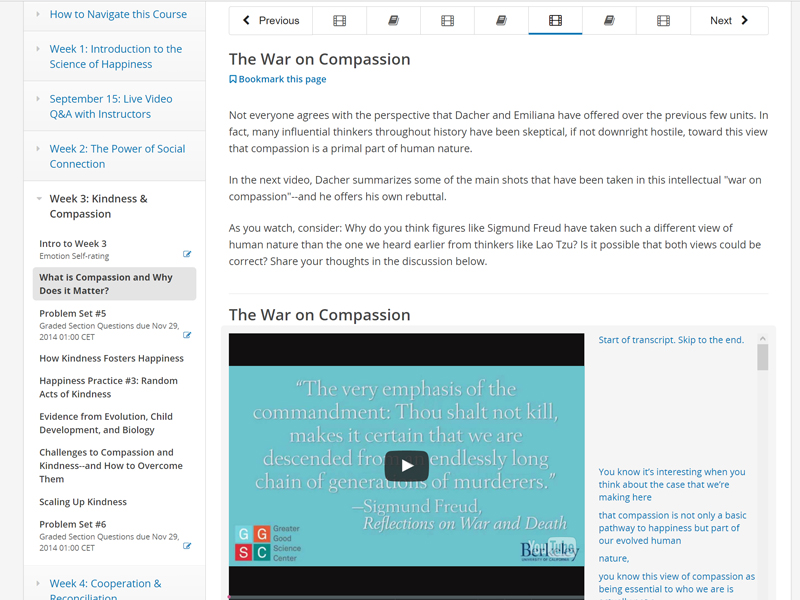Interested in positive psychology and increasing your own happiness? Then the Science of Happiness course could be right for you. Tine Steiss tried it out – but did it change her?
Edx.org offers – among many others – a course by Berkeley X called 'The Science of Happiness'. Being an engineer by training, hence naturally sceptical towards a lot of things that fall into the broad spectrum of 'spirituality', I was intrigued by the title. Of course, I want to be happy and yet I can't just blindly believe anything. So, the word science in this context really got me.
The Science of Happiness course claims to be "the first MOOC (massive open online course) to teach positive psychology. Learn science-based principles and practices for a happy, meaningful life."
Improving happiness with science: the claims
This course is free and you can do it at your own pace. So if you're a sceptic and want some scientific proof why certain habits and behaviours have positive effects on your well-being, sign up for it and give it a try.
During the course, I admit that I sometimes got bored with the many studies they quoted to prove a point and be scientifically convincing. It was only because by that point I had developed trust in what they were claiming and I didn't need further convincing and have proof for every single point.
I had heard about mindfulness, about the benefits of meditation, but I was never convinced enough to actually sit down myself and give it a proper try. Well, after this course I did and I haven't stopped since.
Also, seeing scientific proof of the deep need for social connections, this had a big effect on me. I tend to be an introvert and have the vague idea that I need to surround myself with just a handful of the 'right' people to be happy.
“I had heard about mindfulness, about the benefits of meditation, but I was never convinced enough to actually sit down myself and give it a proper try. Well, after this course I did and I haven't stopped since.”
This view shifted drastically, by focusing on empathy, compassion and also the will to improve relationships rather than avoiding unpleasant conversations. I still try to avoid conflict, but only to a certain degree, because I've learned to appreciate its potential for growth. It also allows for a deeper connection instead of trying to keep up the status quo. Change – after all – is inevitable.
Contents of the MOOC: the science of happiness
What you'll learn:
- Discover what happiness is and why it matters to you
- Learn how to increase your own happiness
- Understand the power of social connections and the science of empathy
- Discover what mindfulness is and applications for the real world

Overview of the Science of Happiness course
I also appreciated the many practices we did during the course: that way you get to try out what works better for you. You develop a broader idea of what you could focus on in the future to develop resilience, improve your happiness and find meaning and therefore motivation in what you are doing.
Happiness practices and course topics
Referred to as 'happiness practices,' you'll try 11 different practices throughout this eight-week course. For example, active listening, random acts of kindness, and writing a self-compassionate letter. They are all connected to the topics of the course:
- The power of social connection
- Kindness & compassion
- Cooperation & reconciliation
- Mindfulness
- Mental habits of happiness
- Gratitude
- Finding your happiness fit and the new frontiers
As you can see, the 'Science of Happiness' course covers a broad spectrum that influences our happiness. As I said before it does so by presenting scientific proof for the findings and recommendations on how to improve your happiness. ●
Images: edX the Science of happiness
Written by Tine Steiss
 Tine is an artist, meditator, media engineer and student of happiness. If she is not traveling she's working on turning her rooftop terrace into an urban garden paradise. Find out more about her on: Instagram, Facebook
Tine is an artist, meditator, media engineer and student of happiness. If she is not traveling she's working on turning her rooftop terrace into an urban garden paradise. Find out more about her on: Instagram, Facebook




Join the conversation
You are posting as a guest. If you have an account, sign in now to post with your account.
There are no comments to display.